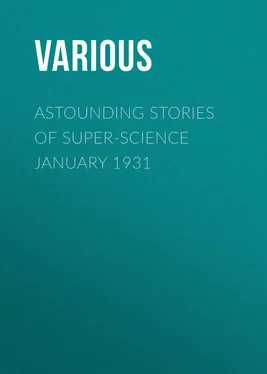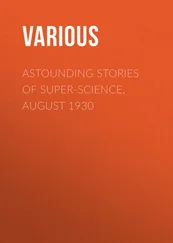Various - Astounding Stories of Super-Science January 1931
Здесь есть возможность читать онлайн «Various - Astounding Stories of Super-Science January 1931» — ознакомительный отрывок электронной книги совершенно бесплатно, а после прочтения отрывка купить полную версию. В некоторых случаях можно слушать аудио, скачать через торрент в формате fb2 и присутствует краткое содержание. Жанр: periodic, foreign_edu, на английском языке. Описание произведения, (предисловие) а так же отзывы посетителей доступны на портале библиотеки ЛибКат.
- Название:Astounding Stories of Super-Science January 1931
- Автор:
- Жанр:
- Год:неизвестен
- ISBN:нет данных
- Рейтинг книги:3 / 5. Голосов: 1
-
Избранное:Добавить в избранное
- Отзывы:
-
Ваша оценка:
- 60
- 1
- 2
- 3
- 4
- 5
Astounding Stories of Super-Science January 1931: краткое содержание, описание и аннотация
Предлагаем к чтению аннотацию, описание, краткое содержание или предисловие (зависит от того, что написал сам автор книги «Astounding Stories of Super-Science January 1931»). Если вы не нашли необходимую информацию о книге — напишите в комментариях, мы постараемся отыскать её.
Astounding Stories of Super-Science January 1931 — читать онлайн ознакомительный отрывок
Ниже представлен текст книги, разбитый по страницам. Система сохранения места последней прочитанной страницы, позволяет с удобством читать онлайн бесплатно книгу «Astounding Stories of Super-Science January 1931», без необходимости каждый раз заново искать на чём Вы остановились. Поставьте закладку, и сможете в любой момент перейти на страницу, на которой закончили чтение.
Интервал:
Закладка:
He turned to another.
“See that Mr. Hunter is taken below and locked up. When we reach New York, he will be handed over to the police.”
“But daddy!” protested Diane, as they rose to comply, her eyes softening now. “We shouldn’t be too severe with Mr. Hunter. After all, he is probably doing only what his paper ordered him to.”
Gratefully Larry turned toward his defender. But he couldn’t let that pass.
“No, I’m acting only on my own initiative,” he said. “No one told me to come.”
For he couldn’t get his city editor involved, and after all it was his own idea.
“You see!” declared Professor Stevens. “He admits it is his own doing. It is clear he has exceeded his authority, therefore, and deserves no sympathy.”
“But can’t you let me stay, now that I’m here?” urged Larry. “I know something about boats. I’ll serve as a member of the crew – anything.”
“Impossible. We have a full complement. You would be more of a hindrance than a help. Besides, I do not care to have the possible results of this expedition blared before the public.”
“I’ll write nothing you do not approve.”
“I have no time to edit your writings, young man. My own, will occupy me sufficiently. So it is useless. You are only wasting your breath – and mine.”
He motioned for his officers to carry out his orders.
But before they could move to do so, in strode a lean, middle-aged Norwegian Larry sensed must be Captain Petersen himself, and on his weathered face was an expression of such gravity that it was obvious to everyone something serious had happened.
Ignoring Larry, after one brief look of inquiry that was answered by Professor Stevens, he reported swiftly what he had to say.
While cruising full speed at forty fathoms, with kite-aerial out, their wireless operator had received a radio warning to turn back. Answering on its call-length, he had demanded to know the sender and the reason for the message, but the information had been declined, the warning merely being repeated.
“Was it a land station or a ship at sea?” asked the professor.
“Evidently the latter,” was the reply. “By our radio range-finder, we determined the position at approximately latitude 27, longitude 65.”
“But that, Captain, is in the very area we are headed for.”
“And that, Professor, makes it all the more singular.”
“But – well, well! This is indeed peculiar! And I had been on the point of turning back with our impetuous young stowaway. What would you suggest, sir?”
Captain Petersen meditated, while Larry held his breath.
“To turn back,” he said at length, in his clear, precise English, “would in my opinion be to give the laugh to someone whose sense of humor is already too well developed.”
“Exactly!” agreed Professor Stevens, as Larry relaxed in relief. “Whoever this practical joker is, we will show him he is wasting his talents – even though it means carrying a supernumerary for the rest of the voyage.”
“Well spoken!” said the captain. “But as far as that is concerned, I think I can keep Mr. Hunter occupied.”
“Then take him, and welcome!”
Whereupon, still elated but now somewhat uneasy, Larry accompanied Captain Petersen from the mess-room; started to, that is. But at a glance of sympathy from Diane, he dared call out:
“Say – hold on, folks! I haven’t had lunch yet!”
When young Larry Hunter reported to the captain of the Nereid , after this necessary meal, he found that the craft had returned to the surface.
Assigned a pair of powerful binoculars, he was ordered to stand watch in the conning-tower and survey the horizon in every direction, in an effort to sight the vessel that had sent out that mysterious radio, but though he cast his good brown eyes diligently through those strong lenses, he saw not so much as a smoke tuft upon the broad, gray-blue surface of the hazy Atlantic.
Gradually, however, as the afternoon wore away, something else came in view. Masses of brownish seaweed, supported by small, berry-like bladders, began drifting by. Far apart at first, they began getting more and more dense, till at last, with a thrill, he realized that they were drawing into that strange area known as the Sargasso Sea.
Shortly after this realization dawned, he was ordered below, and as the tropic sun was sinking over that eery floating tombstone, which according to Professor Stevens marked a nation’s grave, the Nereid submerged.
Down she slid, a hundred fathoms or more, on a long, even glide that took her deep under that veiling brown blanket.
In the navigating room now, Larry stood with the captain, the professor and Diane, studying an illuminated panel on which appeared a cross of five squares, like a box opened out.
The central square reproduced the scene below, while those to left and right depicted it from port and starboard, and those to front and rear revealed the forward and aft aspects of the panorama, thus affording a clear view in every direction.
This, then, was the television device Professor Stevens had referred to the previous afternoon, its mechanical eyes enabling then to search every square inch of those mysterious depths, as they cruised along.
It was the central square that occupied their attention chiefly, however, as they stood studying the panel. While the others represented merely an unbroken vista of greenish water, this one showed the sea floor as clearly as though they had been peering down into a shallow lagoon through a glass-bottomed boat, though it must have been a quarter of a mile below their cruising level.
A wonderful and fearsome sight it was to Larry: like something seen in a nightmare – a fantastic desert waste of rocks and dunes, with here and there a yawning chasm whose ominous depths their ray failed to penetrate, and now and then a jutting plateau that would appear on the forward square and cause Captain Petersen to elevate their bow sharply.
But more thrilling than this was their first glimpse of a sunken ship – a Spanish galleon, beyond a doubt!
There she lay, grotesquely on her side, half rotted, half buried in the sand, but still discernible. And to Larry’s wildly racing imagination, a flood of gold and jewels seemed to pour from her ruined coffers.
Turning to Diane, he saw that her eyes too were flashing with intense excitement.
“Say!” he exclaimed. “Why don’t we stop and look her over? There may be a fortune down there!”
Professor Stevens promptly vetoed the suggestion, however.
“I must remind you, young man,” he said severely, “that this is not a treasure hunt.”
Whereupon Larry subsided; outwardly, at least. But when presently the central square revealed another and then another sunken ship, it was all he could do to contain himself.
Now, suddenly, Diane cried out:
“Oh, daddy, look! There’s a modern ship! A – a freighter, isn’t it?”
“A collier, I would say,” was her father’s calm reply. “Rather a large one, too. Cyclops , possibly. She disappeared some years ago, en route from the Barbados to Norfolk. Or possibly it is any one of a dozen other steel vessels that have vanished from these seas in recent times. The area of the Sargasso, my dear, is known as ‘The Port of Missing Ships.’”
“But couldn’t we drop down and make sure which ship it is?” she pleaded, voicing the very thought Larry had been struggling to suppress.
At the professor’s reply, however, he was glad he had kept quiet.
“We could, of course,” was his gentle though firm rebuke, “but if we stopped to solve the mystery of every sunken ship we shall probably see during this cruise, we would have time for nothing else. Nevertheless, my dear, you may take a short memorandum of the location and circumstances, in the present instance.”
Читать дальшеИнтервал:
Закладка:
Похожие книги на «Astounding Stories of Super-Science January 1931»
Представляем Вашему вниманию похожие книги на «Astounding Stories of Super-Science January 1931» списком для выбора. Мы отобрали схожую по названию и смыслу литературу в надежде предоставить читателям больше вариантов отыскать новые, интересные, ещё непрочитанные произведения.
Обсуждение, отзывы о книге «Astounding Stories of Super-Science January 1931» и просто собственные мнения читателей. Оставьте ваши комментарии, напишите, что Вы думаете о произведении, его смысле или главных героях. Укажите что конкретно понравилось, а что нет, и почему Вы так считаете.









![Various - Birds and Nature Vol. 9 No. 1 [January 1901]](/books/745791/various-birds-and-nature-vol-9-no-1-january-190-thumb.webp)


